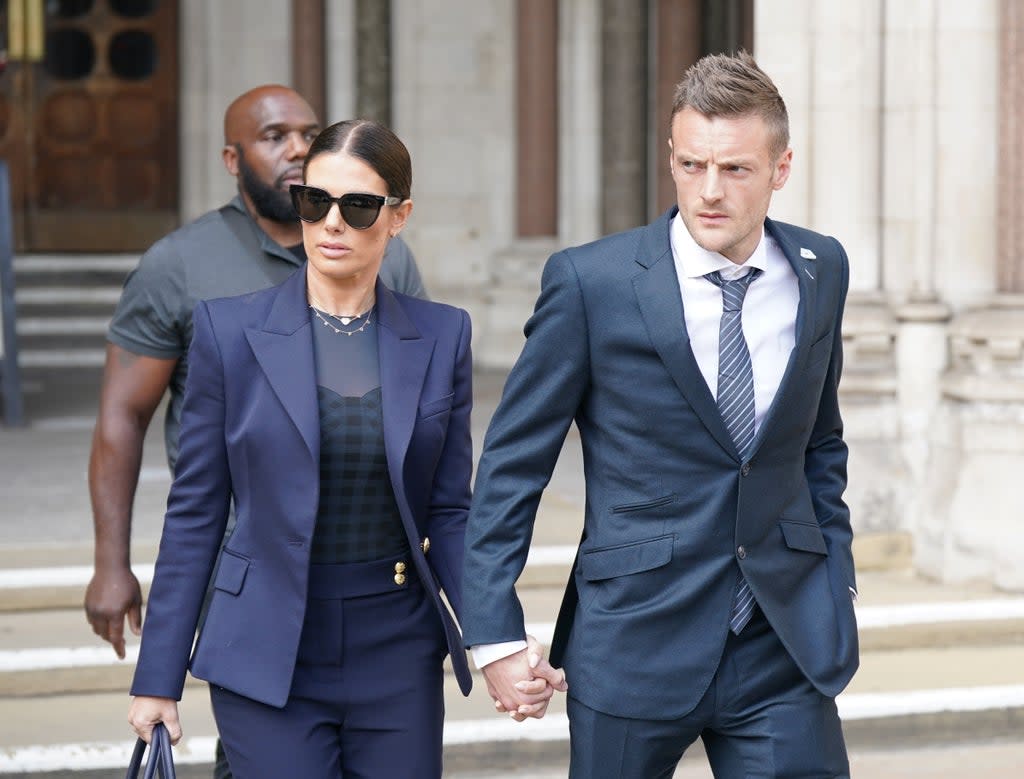Voices: If Wagatha Christie has taught us anything, it’s to never underestimate the power of the ‘unfollow’

The longer time you spend on social media, the more people you will have annoyed. That’s my theory. Since I can’t expect everyone to agree with everything I say, the equation is simple: more opinions = more haters. And as someone who has been very online and very opinionated for about 20 years, believe me I have accumulated a lot of haters.
So it seems, has Rebekah Vardy. This week the libel trial between Vardy and Coleen Rooney got going, after the latter accused Vardy of leaking stories about her to the press. You might remember this as a very social media affair: Rooney posted a lengthy message on Instagram alleging Vardy was responsible for a number of fake stories that had ended up in The Sun. She earned the respect of legions of Columbo fans and the moniker “Wagatha Christie” for her sleuthing skills.
During the trial, Vardy was said to have been furious when Rooney unfollowed her on Instagram, calling her a “c***”, the High Court was told. Even the husbands got involved in the spat: footballer Jamie Vardy unfollowed Wayne Rooney on Instagram. A close friend was reported to have said: “He [Vardy] has made his feelings clear. Cutting [Rooney] off on social media is a totally deliberate snub.”
You might read that and laugh – it’s just Instagram mate, calm down! Don’t take social media so seriously!There is definitely some truth to that. But for those who live and thrive in this online world, the advice is harder to swallow.
As someone who has been snubbed tens of thousands of times over years – by friends, colleagues and people who used to praise my work – I know the feeling. It stings. However much you deny it or pretend not to care, it stings. You can read listicles that help make you feel better, you can practice mindfulness, go for a run, do yoga, whatever: fact is, it hurts when you realise you’ve been “unfollowed”.
But why? Why does it feel like such a big deal? One wellness expert says receiving an unfollow can make us feel like we are not living up to expectation, which can lead to feelings of self-doubt and insecurity. He goes on to compare an unfollow to “shunning” someone, a kind of a social punishment.
And if the shunning itself isn’t bad enough, every year the number of platforms we can be shunned on gets multiplied. Remember the good old days when we only worried about friend requests on Facebook? Or when someone didn’t “poke” you back?
Sure, it was a bit annoying when people ignored you, but you moved on. A modern teenager now has to worry about their follower counts on Insta, Tiktok, Snapchat, Twitter and Facebook (well, maybe not Facebook). They could be tracking their karma on Reddit or subscribers on YouTube. They could also be blocked on Whatsapp or iMessage. The list grows every day.
You can come up with your own “coping strategies” to getting unfollowed, but there is a simple uncomfortable truth here: humans are social animals, we derive pleasure from feeling connected with other people. So getting socially shunned is designed to hurt… and it does.
What to do about it? Well, I say embrace the feeling. Embrace the idea of being unpopular and saying unpopular things. Embrace being unfollowed. I admit this through gritted teeth: when I first started using Twitter, I would be obsessed by every number on my follower count, I thrived on retweets and going viral. I would happily get into arguments because I knew that drama attracts attention – and (therefore) followers. I “gamed” social media to drive up my numbers. It took me a decade to realise I was only doing myself a disservice.
To keep up to speed with all the latest opinions and comment, sign up to our free weekly Voices Dispatches newsletter by clicking here
The higher those numbers go, the more you need to feel like you’ve “made it”. It’s a neverending cycle of pushing the boundaries and looking for ways to get attention. If you’re not in the public eye, you tell yourself, you may as well not exist. So you have to keep trying new ways to boost yourself. You can’t keep it up forever, and the quest for new followers soon becomes exhausting and demoralising.
Famous footballers have less of a struggle to attract followers but that doesn’t mean they are any less insecure or don’t have any feeling of self-doubt. In fact I bet they have more self-doubt than the ordinary person, because they are constantly under the spotlight to perform.
The Wagatha Christie trial is just the latest iteration of the age-old fight between social animals over status, standing and influence. And those of us enjoying the show – which admittedly includes me – are no different to pack animals in the savannah who watched others fight for power. Social media culture has created a more sophisticated and connected world, but deep down we are still the status-hungry animals that have roamed the earth for over a millenia.
But if it’s taught us anything, let it be this: if someone unfollows you on Instagram, take the sting, feel it burn, and then move on. You’ll survive.

 Yahoo News
Yahoo News 
